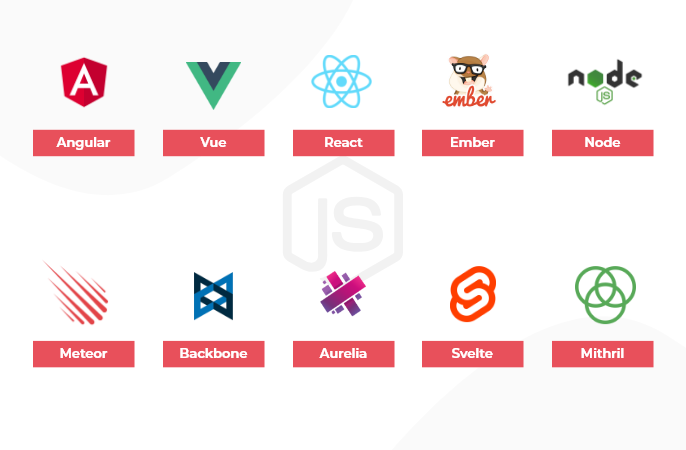Rise by Six: Your Daily Dose of Inspiration
Explore insights and stories that elevate your day.
JavaScript Frameworks: The New Age Titans of Web Development
Discover the game-changing JavaScript frameworks reshaping web development and why you can't afford to ignore them!
Exploring the Top JavaScript Frameworks: Which One is Right for Your Project?
JavaScript frameworks have become essential tools for web developers, offering a structured way to build dynamic applications. As we explore the top JavaScript frameworks, it's important to consider factors such as performance, community support, and learning curve. React, developed by Facebook, is widely popular due to its component-based architecture and virtual DOM, which enhances performance. On the other hand, Angular, maintained by Google, provides a comprehensive solution with robust features like two-way data binding and dependency injection, making it suitable for large-scale applications.
Choosing the right framework depends largely on the specific needs of your project. If you are focusing on a single-page application (SPA), Vue.js might be the best fit due to its simplicity and flexibility. Alternatively, if you require a full-fledged, enterprise-level solution, Angular could be the preferable choice. Ultimately, it's crucial to evaluate the unique requirements and scope of your project before committing to a particular JavaScript framework. Consider tools that will optimize your development process and enhance user experience.

The Impact of JavaScript Frameworks on Modern Web Development Trends
In recent years, JavaScript frameworks have significantly shaped the landscape of modern web development. Frameworks like React, Angular, and Vue.js provide developers with a structured approach to building interactive user interfaces, enhancing both productivity and maintainability. These tools enable developers to create dynamic single-page applications (SPAs) that offer a seamless user experience, which has become a standard in modern web applications. As a result, developers are increasingly adopting these frameworks, leading to a noticeable shift in development practices and trends.
The rise of JavaScript frameworks has also influenced web performance and design trends. With the focus on component-based architecture, developers can easily manage state and improve application scalability. Moreover, frameworks enable the use of modern features and capabilities, such as server-side rendering and progressive web apps (PWAs), which contribute to faster load times and enhanced performance. As web development continues to evolve, the impact of these frameworks will likely catalyze further innovation, making them indispensable tools for developers aiming to meet the growing demands of users.
A Beginner's Guide to JavaScript Frameworks: Key Concepts and Best Practices
JavaScript frameworks are essential tools in modern web development, enabling developers to build dynamic and responsive user interfaces with ease. For beginners, understanding key concepts such as the Document Object Model (DOM), components, and state management is crucial. Frameworks like React, Vue.js, and Angular each offer unique approaches to building applications. Familiarizing yourself with their core philosophies and features will set a strong foundation for your development journey. Here are a few best practices to keep in mind:
- Understand the framework's lifecycle hooks.
- Organize your project structure logically.
- Utilize state management tools appropriately.
As you delve deeper into the world of JavaScript frameworks, it is important to stay updated with community resources and documentation. Engaging with forums and attending workshops can enhance your understanding and skills. Additionally, writing clean and maintainable code should be a priority; this includes using comments effectively and following a consistent coding style. Remember, practice is key—build small projects to apply what you've learned, testing each framework's capabilities. By following these guidelines and embracing a growth mindset, you'll transform from a beginner into a proficient JavaScript developer.